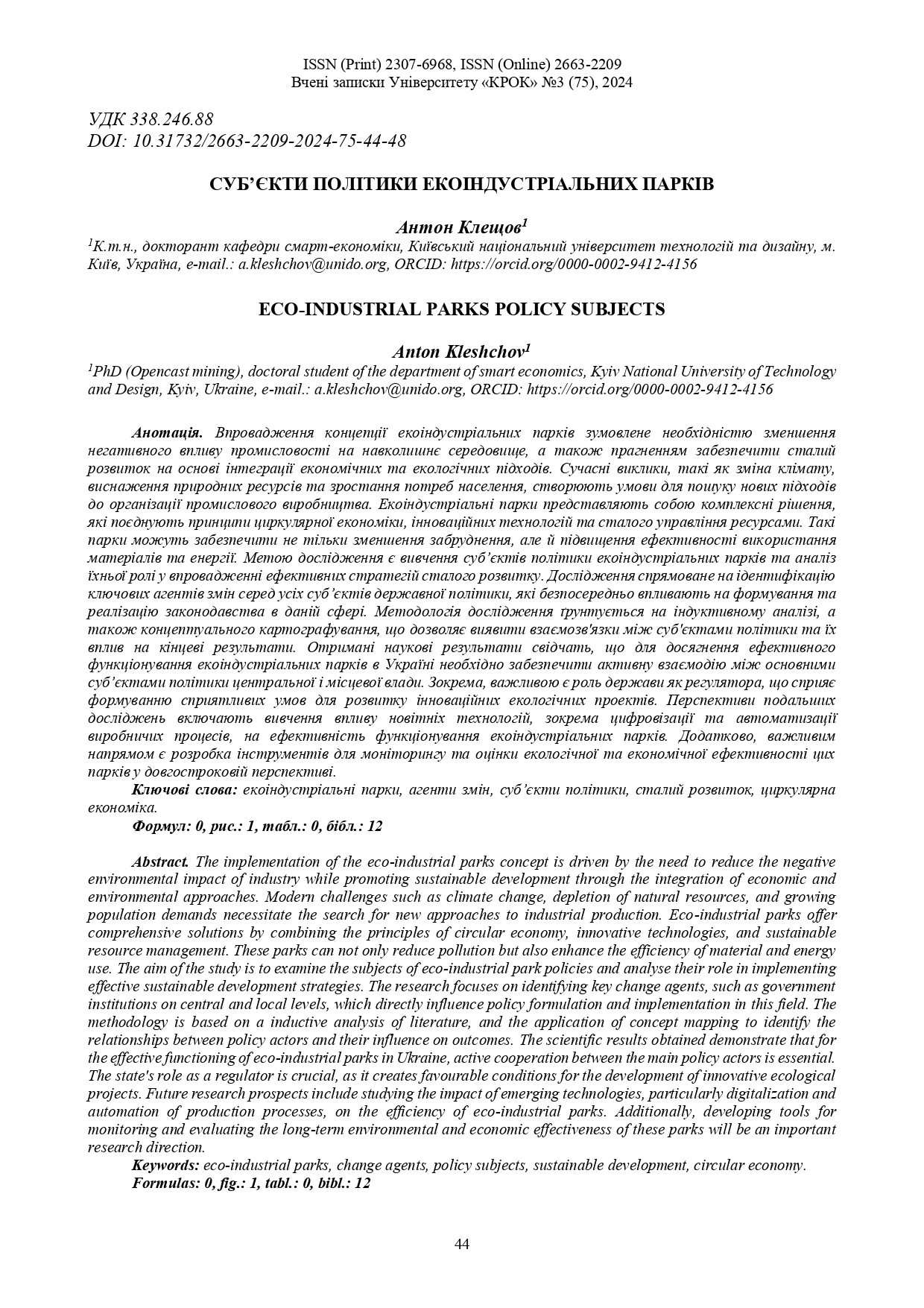ECO-INDUSTRIAL PARKS POLICY SUBJECTS
DOI:
https://doi.org/10.31732/2663-2209-2024-75-44-48Keywords:
eco-industrial parks, change agents, policy subjects, sustainable development, circular economyAbstract
The implementation of the eco-industrial parks concept is driven by the need to reduce the negative environmental impact of industry while promoting sustainable development through the integration of economic and environmental approaches. Modern challenges such as climate change, depletion of natural resources, and growing population demands necessitate the search for new approaches to industrial production. Eco-industrial parks offer comprehensive solutions by combining the principles of circular economy, innovative technologies, and sustainable resource management. These parks can not only reduce pollution but also enhance the efficiency of material and energy use. The aim of the study is to examine the subjects of eco-industrial park policies and analyse their role in implementing effective sustainable development strategies. The research focuses on identifying key change agents, such as government institutions on central and local levels, which directly influence policy formulation and implementation in this field. The methodology is based on a inductive analysis of literature, and the application of concept mapping to identify the relationships between policy actors and their influence on outcomes. The scientific results obtained demonstrate that for the effective functioning of eco-industrial parks in Ukraine, active cooperation between the main policy actors is essential. The state's role as a regulator is crucial, as it creates favourable conditions for the development of innovative ecological projects. Future research prospects include studying the impact of emerging technologies, particularly digitalization and automation of production processes, on the efficiency of eco-industrial parks. Additionally, developing tools for monitoring and evaluating the long-term environmental and economic effectiveness of these parks will be an important research direction.
Downloads
References
Lambert, A. J. D., & Boons, F. A. (2002). Eco-industrial parks: stimulating sustainable development in mixed industrial parks. Technovation, 22(8), 471–484. https://doi.org/10.1016/s0166-4972(01)00040-2
Carlini, B. H., Garrett, S. B., Matos, P., Nims, L. N., & Kestens, Y. (2024). Identifying policy options to regulate high potency cannabis: A multiple stakeholder concept mapping study in Washington State, USA. International Journal of Drug Policy, 123, 104270. https://doi.org/10.1016/j.drugpo.2023.104270
Venn, R., & Burbi, S. (2023). Agroforestry policy development in England: a question of knowledge transference. Land Use Policy, 134, 106936. https://doi.org/10.1016/j.landusepol.2023.106936
Yan, B., & Wang, Y. (2024). Evaluating the impact of technological development policy on the high-quality development of the manufacturing industry: Mechanisms and threshold effects. Heliyon, 10(16), Стаття e35858. https://doi.org/10.1016/j.heliyon.2024.e35858
Ingstrup, M. B., Morisson, A., Damgaard, T. M., & Lamberty, J. (2024). An actor-centric approach for defining policy action during cluster development. Regional Science Policy & Practice, 16(5), 100037. https://doi.org/10.1016/j.rspp.2024.100037
Arzo, S. & Hong, M. (2024). Resilient green infrastructure: Navigating environmental resistance for sustainable development, social mobility in climate change policy. Heliyon, 10, e33524. https://doi.org/10.1016/j.heliyon.2024.e33524
Liu, Y., Chen, D., Liu, Y., & Zhou, X. (2024). A qualitative comparative analysis of the evolution path of postgraduate enrollment expansion policies and social development in China. Heliyon, Стаття e25772. https://doi.org/10.1016/j.heliyon.2024.e25772
Tas, N., et al. (2021). An international framework for eco-industrial parks (2nd ed.). Publications of the Global Eco-Industrial Parks Programme. Washington, DC: The World Bank Group. Available at: https://geipp-ukraine.org/wp-content/uploads/2021/08/EIP-International-Framework-for-EIP-Version-2.0-1.pdf (Accessed: 08 August 2024).
Zhao, H., Zhao, H., & Guo, S. (2017). Evaluating the comprehensive benefit of eco-industrial parks by employing multi-criteria decision making approach for circular economy. Journal of Cleaner Production, 142, 2262–2276. https://doi.org/10.1016/j.jclepro.2016.11.041
Sidelkovsky, O. (2020). Суб’єкти формування та реалізації публічної політики у сфері охорони здоров’я. Public Law, (37), 116–123. https://doi.org/10.37374/2020-37-10
Yarovoi, T. (2019). The subjects of the State Policy in the field of National Security of Ukraine as objects of the indirect lobby influence. Public administration and local government, (4(43)), 31–36. https://doi.org/10.33287/101904
Медяник, В. (2021). Суб’єкти формування та реалізації державної соціальної політики. Юридичний вісник, (3), 128–133. https://doi.org/10.32837/yuv.v0i3.2194

Downloads
Published
How to Cite
Issue
Section
License

This work is licensed under a Creative Commons Attribution-NonCommercial 4.0 International License.

